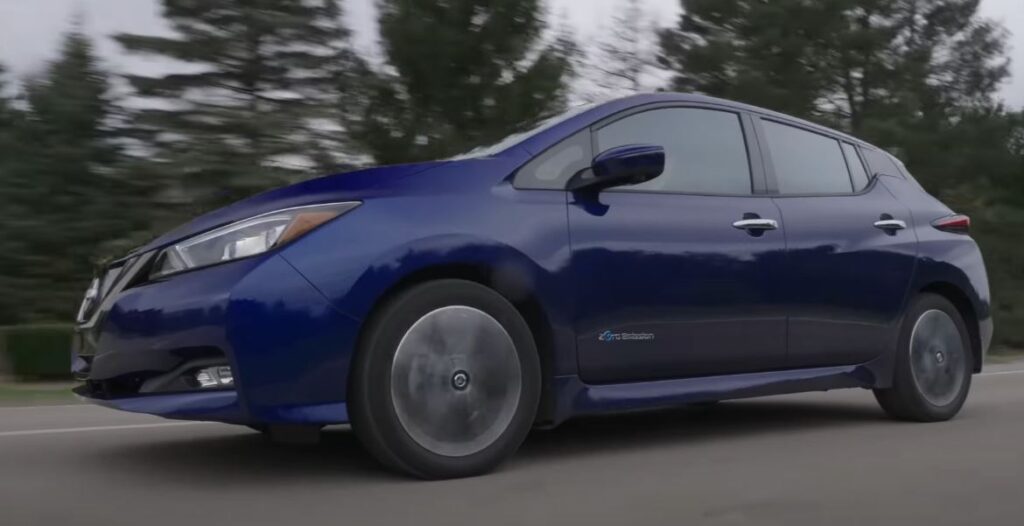
Some vehicles quietly endure in the crowded and rapidly changing electric vehicle market, never making headlines but continuously demonstrating their value. One such device is the Nissan Leaf. It may not have the glitz of a Tesla or the technological glitz of a Hyundai Ioniq, but it is still a very good option for drivers who appreciate dependability, economy, and simplicity.
The Leaf has influenced the number of people who have driven electric cars for the first time in the last ten years. It doesn’t try to shine; it just does what it’s supposed to, like a reliable bicycle that just works. Furthermore, it’s not a question of whether the Leaf is still innovative in 2025. The question is whether it still makes financial and practical sense. The answer is a quiet, confident yes for a significant portion of drivers, particularly those who commute in cities or are new to electric vehicles.
Nissan Leaf 2025 Quick Facts
| Feature | Specification |
|---|---|
| Starting Price | £28,495 (UK) |
| Battery Options | 39kWh (standard) |
| Realistic Range | 128–168 miles (based on tests and EPA ratings) |
| Charging Standard | CHAdeMO DC Fast Charging (slower than CCS) |
| 0–60 mph Acceleration | 7.9 sec (standard) / 6.8 sec (discontinued e+) |
| Infotainment | 8″ display, Apple CarPlay, Android Auto |
| Seats / Cargo Space | 5 passengers / 435 litres |
| Warranty | Battery: 8 years / 100,000 miles |
Why Is the Leaf Still Valuable?
To begin with, the Leaf’s primary selling point is its affordability. It provides one of the most affordable paths to EV ownership, especially for consumers wishing to switch from gasoline-powered vehicles without going over budget, thanks to entry prices that are significantly lower than those of its more recent rivals.
It is especially well-suited for navigating through cities because of its exceptionally smooth ride, predictable handling, and clear controls. Consider the Leaf as an experienced barista who will consistently make your coffee every morning without surprising you with latte art or edgy tricks.
There are trade-offs, but they are manageable
The Leaf is frequently criticized for its range and charging speed. The faster, more widely used CCS format is gradually replacing the CHAdeMO charging standard on which it is based. Longer wait times on road trips and a decrease in compatible fast chargers are the results of this.
Additionally, real-world results typically fall closer to 128 miles, even though the official range on paper is about 168 miles. To put it in perspective, however, this range is more than adequate for the typical UK driver who travels 20 to 30 miles per day, especially when using a home charger. Most Leaf owners wake up to a full “tank” after plugging in overnight, which is remarkably similar to charging your phone before bed.
Where the Leaf Succeeds Silently
The Leaf’s incredibly dependable performance over time is one of its frequently disregarded advantages. Even after more than 100,000 kilometers, many used models—particularly the 2018+ second-generation models—report very little battery degradation. Its longevity and low operating costs make it a very flexible option for fleet or second-car households.
According to Bristol rideshare driver Chris L., “It’s the easiest car I’ve ever owned.” It simply functions. No noise, no oil changes, and inexpensive to operate. I’ve already saved hundreds of dollars.
Another noteworthy feature is the e-Pedal driving system. It makes city driving surprisingly simple and less taxing by enabling you to accelerate and decelerate with a single pedal, especially in stop-start traffic.
Is It Still Competitive in a Sea of Rivals?
From an objective standpoint, newer models such as the MG4, Peugeot e-208, and even Nissan’s own Ariya are surpassing the Leaf. These vehicles have newer designs, faster charging times, and greater range. However, the Leaf remains competitive due to its lower price, track record of reliability, and extensive feature set, which includes emergency braking, blind-spot monitoring, and ProPilot Assist.
The reasoning for selecting a Chromebook over a MacBook is the same. You only need a machine that can do the job reliably and reasonably; you don’t always need the most expensive one.
Future Prospects: Is a New Era Approaching?
It is anticipated that Nissan will phase out the current Leaf in the upcoming years and replace it with a redesigned EV that most likely has a crossover form factor. However, for the time being, the 2025 Leaf still fulfills its function of providing a practical, affordable EV for everyday use.
It’s so modest that it almost has a charming quality. In an EV market where tech showcases and luxury branding predominate, the Leaf is like that friend who never complicates things, always arrives on time, and remembers your birthday. It simply gets you to your destination quietly, effectively, and without any hassle.
